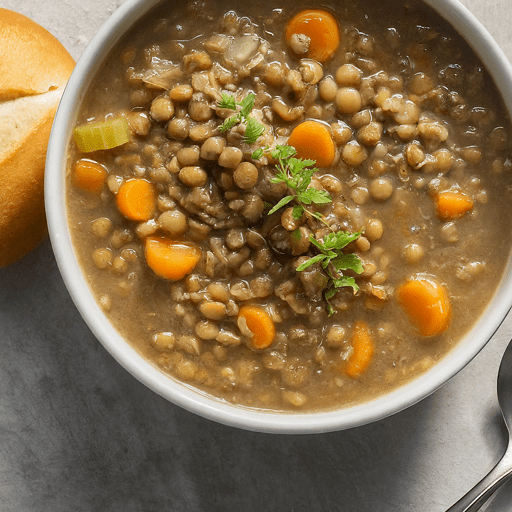Lentil soup is not only delicious and comforting but also a nutritious dish packed with essential nutrients. Among these nutrients, protein plays a significant role, making lentil soup a popular choice for those looking to boost their protein intake. In this article, we’ll explore the protein content in a bowl of lentil soup, its nutritional composition, health benefits, variations, and how to make it at home.
Introduction to Lentil Soup
Explaining Lentil Soup
Lentil soup is a hearty and flavorful dish made from lentils, vegetables, herbs, and spices. It is a staple in many cuisines around the world and is known for its rich taste and nutritional value.
Nutritional Composition of Lentil Soup
Protein Content in Lentil Soup
Lentil soup is an excellent source of plant-based protein. One bowl (approximately 1 cup) of lentil soup contains about 12 grams of protein on average, making it a satisfying and nutritious meal option.
Other Nutrients in Lentil Soup
In addition to protein, lentil soup is also rich in other essential nutrients such as fiber, vitamins, and minerals. It contains dietary fiber, which aids in digestion and helps maintain a healthy gut. Lentil soup also provides a good dose of vitamins and minerals, including iron, folate, potassium, and magnesium.
Health Benefits of Lentil Soup
Protein for Muscle Health
Protein is essential for muscle growth and repair, making lentil soup an ideal choice for individuals looking to maintain or build muscle mass. The protein content in lentil soup helps support muscle health and recovery after exercise.
Fiber for Digestive Health
The high fiber content in lentil soup promotes digestive health by aiding in regular bowel movements and preventing constipation. Fiber also helps keep you feeling full and satisfied for longer periods, which can aid in weight management.
Vitamins and Minerals
Lentil soup is a nutrient-dense dish that provides essential vitamins and minerals necessary for overall health and well-being. These include iron for healthy blood circulation, folate for cell regeneration, potassium for electrolyte balance, and magnesium for muscle function.
Variations of Lentil Soup
Different Types of Lentil Soup
There are numerous variations of lentil soup, each with its own unique flavor profile and ingredients. Some popular variations include:
- Moroccan lentil soup with spices like cumin and coriander
- Italian lentil soup with tomatoes and herbs like basil and oregano
- Indian lentil soup (dal) with aromatic spices like turmeric, cumin, and garam masala
How to Make Lentil Soup
Simple Lentil Soup Recipe
Making lentil soup at home is easy and requires just a few basic ingredients. Here’s a simple recipe to try:
- Heat olive oil in a large pot over medium heat. Add diced onions, carrots, and celery, and cook until softened.
- Add minced garlic, dried herbs (such as thyme and bay leaves), and rinsed lentils to the pot. Stir to combine.
- Pour in vegetable broth and bring the mixture to a boil. Reduce heat and simmer until the lentils are tender, about 20-25 minutes.
- Season the soup with salt, pepper, and any additional herbs or spices to taste. Serve hot and enjoy!
Conclusion
In conclusion, lentil soup is a nutritious and delicious dish that provides a significant amount of protein along with other essential nutrients. Whether you’re looking for a comforting meal on a cold day or a nutritious option to support your health and fitness goals, lentil soup is an excellent choice.
FAQs about Protein Content in Lentil Soup
- Is lentil soup a complete source of protein?
- While lentil soup is rich in protein, it may not provide all essential amino acids on its own. However, pairing it with grains like rice or bread can create a complete protein source.
- Can lentil soup help with weight loss?
- Yes, lentil soup is low in calories and high in protein and fiber, which can help keep you feeling full and satisfied, making it a great option for those looking to lose weight.
- Is lentil soup suitable for people with dietary restrictions?
- Lentil soup is naturally gluten-free and suitable for vegetarians and vegans. However, individuals with specific dietary restrictions should check ingredient labels to ensure compliance.
- Can lentil soup be frozen for later use?
- Yes, lentil soup freezes well and can be stored in an airtight container for up to three months. Simply thaw and reheat before serving.
- Are there any variations of lentil soup for different dietary preferences?
- Yes, lentil soup can be customized to suit different dietary preferences and flavor preferences. Whether you prefer spicy, mild, or savory, there’s a lentil soup recipe out there for you.
How Much Protein is There in Lentils per 100g
Lentils, those tiny legumes, often overlooked, are power-packed with nutrients, including protein. Understanding the protein content in lentils is crucial, especially for those seeking plant-based sources of protein. In this article, we’ll explore how much protein is present in lentils per 100g, along with their nutritional value, health benefits, types, cooking methods, and more.
Nutritional Composition of Lentils
Protein Content in Lentils
Lentils are renowned for their high protein content, making them an excellent choice for vegetarians, vegans, and anyone looking to increase their protein intake. On average, lentils contain around 9 grams of protein per 100 grams serving, making them one of the richest plant-based sources of protein.
Other Essential Nutrients in Lentils
In addition to protein, lentils are also rich in fiber, vitamins, and minerals. They are a good source of dietary fiber, which aids in digestion and helps regulate blood sugar levels. Lentils also contain significant amounts of iron, folate, potassium, and magnesium, all of which are essential for overall health and well-being.
Health Benefits of Lentils
Protein for Muscle Health
Protein is vital for muscle growth, repair, and maintenance. Lentils provide a substantial amount of protein, making them an excellent choice for athletes, bodybuilders, and anyone looking to support their muscle health naturally.
Fiber for Digestive Health
The fiber content in lentils promotes digestive health by preventing constipation, promoting regular bowel movements, and nourishing the beneficial bacteria in the gut. A diet rich in fiber can reduce the risk of various digestive issues, including diverticulitis and irritable bowel syndrome (IBS).
Minerals for Overall Well-being
Lentils are packed with essential minerals like iron, which is crucial for transporting oxygen throughout the body, folate, which is essential for cell division and DNA synthesis, potassium, which helps regulate blood pressure and muscle function, and magnesium, which supports bone health and nerve function.
Different Types of Lentils
Green Lentils
Green lentils have a robust flavor and hold their shape well when cooked, making them ideal for salads, soups, and side dishes.
Red Lentils
Red lentils cook quickly and have a slightly sweet flavor, making them perfect for curries, stews, and dals.
Brown Lentils
Brown lentils have a mild, earthy flavor and are versatile enough to be used in a variety of dishes, including soups, casseroles, and salads.
Cooking with Lentils
Versatile Ingredient in Cooking
Lentils are incredibly versatile and can be used in a wide range of dishes. From soups and stews to salads and curries, lentils add texture, flavor, and nutrition to any meal.
Lentil Soup
Lentil soup is a comforting and nutritious dish that is easy to make and perfect for cold winter days. Simply simmer lentils with vegetables, herbs, and spices for a hearty and satisfying meal.
Lentil Salad
Lentil salad is a refreshing and healthy dish that is great for picnics, potlucks, and packed lunches. Toss cooked lentils with fresh vegetables, herbs, and a tangy vinaigrette for a flavorful salad.
Lentil Curry
Lentil curry is a flavorful and satisfying dish that is popular in Indian cuisine. Cook lentils with onions, garlic, ginger, and spices for a delicious curry that pairs well with rice or naan bread.
Conclusion
In conclusion, lentils are a nutritional powerhouse, providing a significant amount of protein along with fiber, vitamins, and minerals. Incorporating lentils into your diet can help support muscle health, digestive health, and overall well-being.
FAQs about Protein Content in Lentils per 100g
- How much protein is there in lentils per 100g?
- Lentils contain approximately 9 grams of protein per 100 grams serving, making them a rich source of plant-based protein.
- Are lentils a complete source of protein?
- While lentils are high in protein, they are not considered a complete source of protein as they lack certain essential amino acids. However, pairing them with grains like rice or quinoa can create a complete protein source.
- Can lentils help with weight loss?
- Yes, lentils are low in calories and high in protein and fiber, which can help keep you feeling full and satisfied, making them a great option for weight loss.
- Are lentils suitable for people with gluten intolerance?
- Yes, lentils are naturally gluten-free, making them an excellent choice for individuals with gluten intolerance or celiac disease.
- How should lentils be stored to maintain their freshness?
- Lentils should be stored in an airtight container in a cool, dry place away from direct sunlight. They can be kept for up to a year if stored properly.





